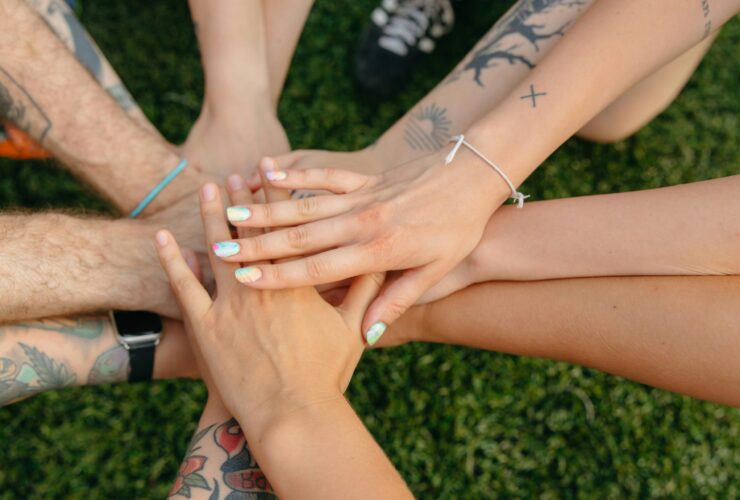The South Asian community has a complex relationship with mental health. While topics around therapy and mental health are often stigmatized and dismissed as Western concepts, the reality is that South Asians face unique mental health challenges, shaped by many different sociopolitical and environmental factors. These factors can include racial discrimination, religious discrimination, and immigration and acculturation difficulties. South Asian women, in particular, face further complications, especially with the intergenerational trauma and systemic oppression that exist within our culture, history, and norms and standards.
Stigma

There is a significant stigma surrounding mental health and mental illness in the South Asian community, particularly among older generations. Mental health in and of itself can be considered taboo. Further, mental illness is often seen as a weakness or a personal flaw. Any symptoms of mental illness are often minimized or outright dismissed. And even if symptoms are acknowledged, seeking help is rarely encouraged. This can lead to feelings of shame and isolation. As a result, South Asian women may not seek the help they need out of fear of being judged or ostracized by their family or community.
Patriarchy & Gender Expectations
Many families and communities who follow traditional South Asian cultural norms continue to hold heteronormative and patriarchal values. These norms dictate that South Asian women be held to certain standards of perfect, obedient, and even subservient behavior. This puts a lot of pressure on women to keep quiet and mold themselves to fit unrealistic expectations. For example, South Asian women can be expected to do everything and sacrifice themselves. This expectation is not only for their immediate family but also for the family of their spouse and in-laws. This can lead to feelings of inadequacy, depression, low self-esteem, and low self-confidence. Women who speak out against abuse, injustice, and oppression are often dismissed, silenced, or even punished. They often face social rejection too, for going against their families and communities. This further perpetuates the cycle of oppression. And this makes it even more difficult for South Asian women to break free from traditional cultural constraints.
Historical and Intergenerational trauma
South Asian women also face intergenerational trauma that has been passed down through their families and communities. The trauma of colonialism, displacement, violence, and casteism has left deep scars on the South Asian community. And this trauma can be especially pronounced in women. Women are often the ones who bear the burden of carrying on their cultural traditions and values while also caring for their families and communities. These burdens can be emotionally taxing and mentally draining. The effects of this trauma can manifest in various ways, including anxiety, depression, and post-traumatic stress disorder (PTSD).
Saving Face: What will people think?

To add another complicated layer, saving ‘face’ is an important characteristic of South Asian culture. One common phrase among South Asian communities is “log kya kahenge” (what will people think?). This well-intended phrase is often used for the preservation of a family’s reputation. But it can lead to unintended, negative impacts on mental health. The underlying idea is that South Asian women should prioritize the feelings of their families and communities over their own. In other words, they should not reveal or do certain things because the broader community will not accept it. This kind of thinking can create immense pressure to conform. It can also lead to a fear of speaking up or stepping out of line. South Asian women may feel that they must uphold the construct of a dignified, dutiful Brown woman. And anything less than that is a failure to perform traditional womanhood.
South Asian women are often the backbone of our families and communities. It is so crucial that we prioritize mental health. However, with all of these complicators factors and pressures, it may be hard to know where to start taking care of ourselves.
Sitting with the South Asian Female Experience (SAFE) Support Group
Our Sitting with the South Asian Female Experience support group provides a unique opportunity for South Asian female-identifying folks to come together and explore their shared experiences. This group offers a safe space for women to share their personal experiences and discuss the impact of their culture on their self-perception, relationships, and worldview.
The group will explore various topics, including legacy burdens, guilt and shame, dating and relationships, body image, boundaries, and more. In discussing cultural norms and values, the group will offer tools for managing and minimizing the impact of unhelpful traditions and exploring new values to adopt.
Legacy burdens:
Legacy burdens, or intergenerational trauma, are burdens or mental and emotional ‘weights’ passed down through the generations, and can be the result of the ways that families address certain issues. These burdens can have a significant impact on the mental and emotional well-being of South Asian women. By having a safe, communal space to discuss these issues, members can start to process and find ways to move forward.
Guilt and shame:
The group will discuss the difference between guilt and shame, and members will get to explore their relationship with both emotions. South Asian women often experience emotional blackmail, social comparison, fear, guilt, and shame due to their family or community’s attempts to control, mold, and discipline. The group uses somatic awareness, or body awareness, to identify the role of these emotions and how they show up in life. Members will also learn tools to address these emotions using self-compassion.
Dating and relationships:
The group will explore the impact of cultural and familial expectations on dating and relationships. South Asian women are often expected to be “good and responsible betis” or “good and obedient partners and siblings,” which can make it difficult or even impossible to be authentically yourself. Together, we will navigate the complicated factors of codependency, enmeshment, love being equated with sacrifice, and conflict being considered ‘bad’ or disrespectful.
Body image:
We will delve into the complex relationship that South Asian women can have with their bodies. Conflicting and negative messages about body image, including body size, body hair, hair type, and colorism, can lead to feelings of inadequacy and to body dysmorphia. We will explore harmful beauty standards and their impact on self-perception.

Boundaries:
We will also explore the concept of setting boundaries, maintaining privacy, and saying “no” within a South Asian family and cultural system. We will look at what was modeled for us growing up, and our own processes of setting boundaries directly or indirectly. The support group will provide a safe space for members to discuss these challenges and develop tools to set healthy boundaries.
With your South Asian female facilitator, you and your fellow members will embark on a journey of exploration, processing, and healing. You don’t have to walk this path by yourself. In our SAFE group, we will co-create support and navigate our complex cultural landscape together.
For more information about our support group, please visit our Sitting with the South Asian Female Experience page or contact groups@yellowchaircollective.com.
Begin Therapy with Asian Women in Los Angeles, CA, and New York
At Yellow Chair Collective, we provide both individual therapy and support groups for South Asian women to discuss their mental health issues and seek support. struggling with mental health challenges. Our providers provide culturally sensitive and trauma-informed care that is tailored to the unique needs of the South Asian community. In therapy, we can help you to find the balance of personal identity and cultural background that you are looking for. At our Los Angeles, CA, and New York City, NY-based therapy practice we have many culturally sensitive, Asian American therapists who can help you in this journey. For your added convenience and simplicity, we offer online therapy for anyone in the state of California or New York. We know that your mental health is important, and we want to help you work through whatever’s holding you back. Follow the steps below to begin.
- Fill out the contact form to get connected with us.
- Get matched with a skilled Asian American therapist.
- Start processing your own family dynamics that still impact you today.
Other Services at Yellow Chair Collective
There are many options for treatment using online therapy in California and New York, it just depends on what you’re needing. And while we certainly service Asian American folks, we also work with individuals from other cultures, too. So, whether you’re needing support in overcoming anxiety, burnout, trauma, or PTSD, we can help. Likewise, we serve teens and couples in need of support, too. So when you start online therapy with us, you can bring your whole self, including past struggles, cultural impacts, and more.
Relevant Resources
Yellow Chair Collective: The Podcast | Asian Racial Stress & Trauma with Sharon Kwon
https://open.spotify.com/episode/3VXA1LZkUxml3uqvyfpwSq?si=WTby5eiKTaC1jce53TBGcg
Yellow Chair Collective: The Podcast | Asian Women & Intersectional Body Acceptance (with Angela Nguyen & Catherine Vu)
https://open.spotify.com/episode/0IiqgwuNZpGY781u3GQSc0?si=BPvMjpN-TMa1vrlDyCc94g
Yellow Chair Collective: The Podcast | 3 Dead-Easy Tips to Setting Boundaries for 2nd Gen Asian-Americans with Allison Ly, LCSW (Pt. 1)
https://open.spotify.com/episode/6riaVWr4T2BSsMY27ISc35?si=p5R81rTaQ7GN8EH1orHhaA
Yellow Chair Collective: The Podcast | 3 Dead-Easy Tips to Setting Boundaries for 2nd Gen Asian-Americans with Allison Ly, LCSW (Pt. 2)
https://open.spotify.com/episode/2o67dbORIeAZypjNxDQB9v?si=Hm4fN4QqTp6NG4pdB8lwsg






